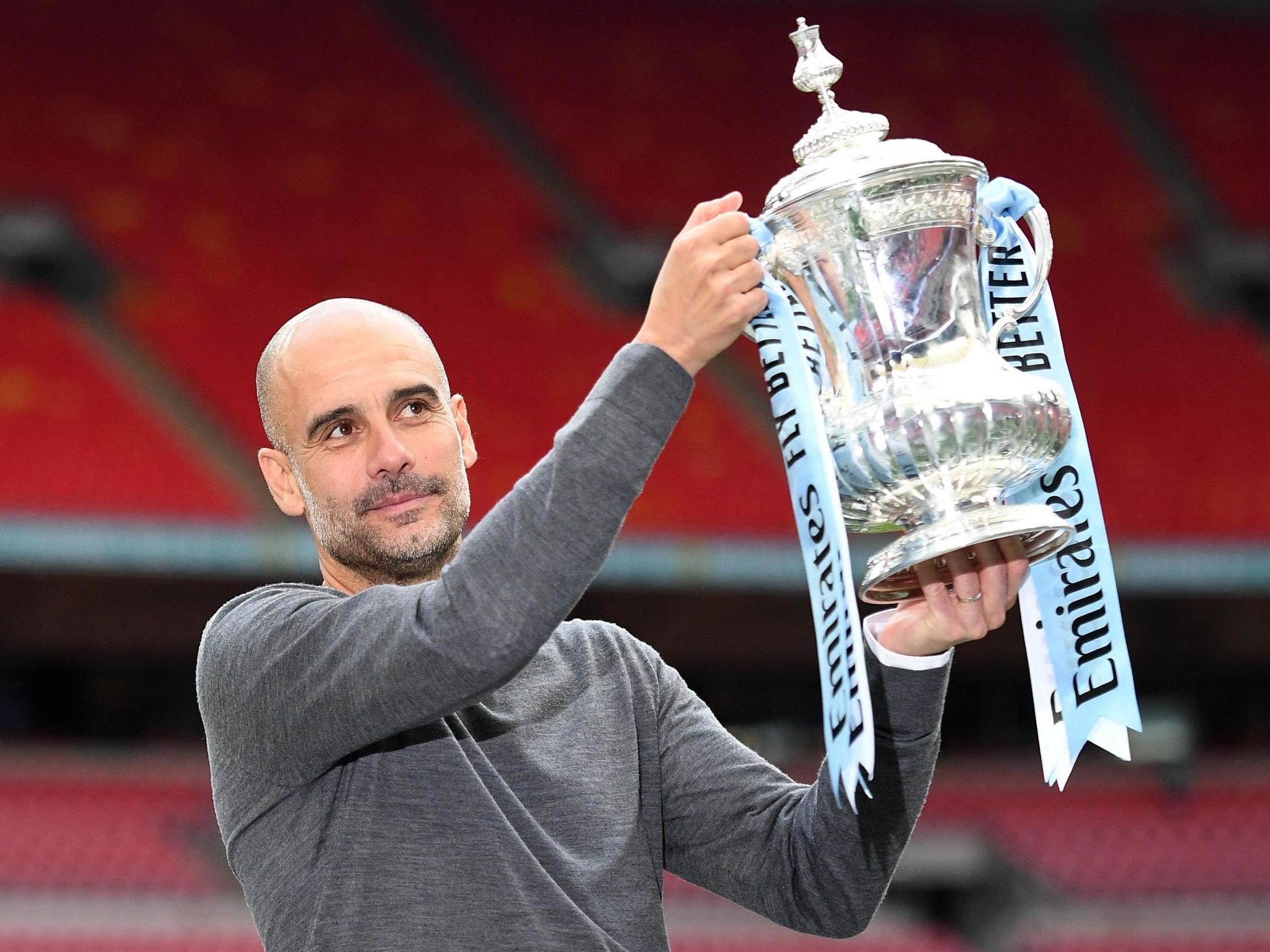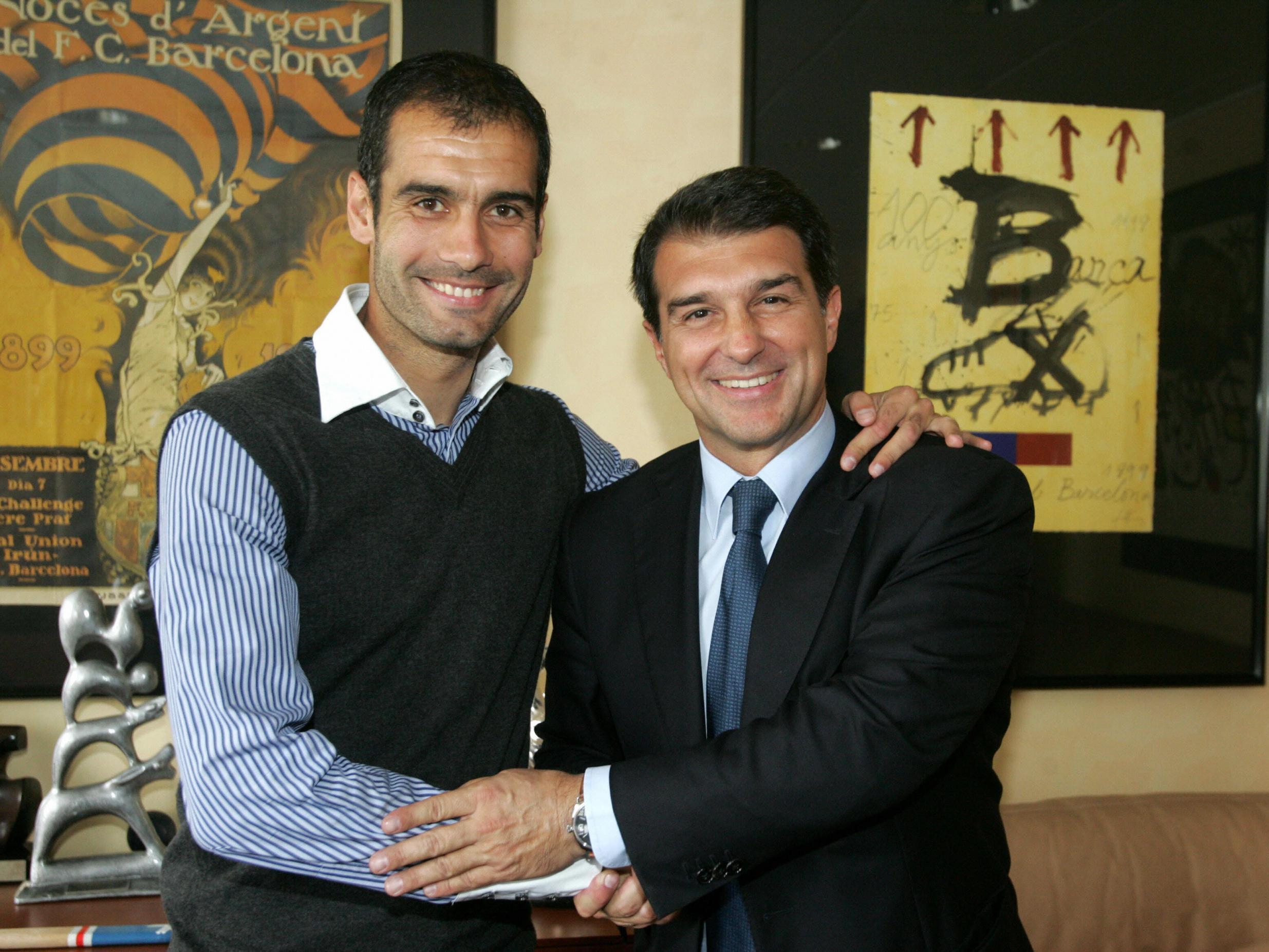Pep Guardiola’s FA Cup rivals want to emulate him – but first they must beat him
For Mikel Arteta, Frank Lampard and Ole Gunnar Solskjaer an FA Cup win would vindicate the work being put in and offer tangible proof of progress. Guardiola knows this better than anyone

It’s an exchange that seems all the more incredible now, although for totally opposite reasons to the time.
Back in 2008, when Joan Laporta first told Pep Guardiola he wanted him to be the new Barcelona manager, the Catalan had quite the response. “You haven’t got the balls!”
It was partly said in jest, but partly because it at that point seemed preposterous to entrust the future of such a massive club to a novice whose main selling point was his connection to it.
No more. You don’t need balls to make an appointment like that. It’s become relatively routine. This week’s FA Cup semi-finals are testament to that. They are another legacy of Guardiola.
He is actually the elder statesman, against a series of coaches who want to emulate him, and a series of clubs who have followed Barcelona’s lead.
Guardiola has cleared the way for all of Mikel Arteta, Frank Lampard and Ole Gunnar Solskjaer.
The twist now is they will all likely need to clear Guardiola out of the way to try and claim their first major trophy, since Manchester City are the evident favourites for this season’s FA Cup.
It also makes these semi-finals about more than the silverware. The trophy itself becomes about a signpost, a visible illustration that a manager’s side are moving up a level.
In that regard, as routine as Guardiola has made these appointments, it is still some way remarkable that three of England’s biggest clubs – and thereby Europe’s biggest clubs – have simultaneously entrusted their own futures to managers of no real calibre. Again, the reality is that if they didn’t have a prior connection, they’d be nowhere near the job.
It displays the value of that in modern football. It buys clubs’ time, but also buys the managers themselves time. They need it. Because, as much as they want to be the next Guardiola, they’ve a lot to learn.
It feels like Lampard has a broad idea of how he wants to play, but still has a lot to fill in. The consistent defensive problems are a profound illustration of that, and way worse than the glass jaw to some of Guardiola’s teams.
Solskjaer seems to still be working out his own approach, as well as the exact rigours of a club of Manchester United’s magnitude. Prior experience at Molde or Cardiff City is virtually irrelevant.
Arteta meanwhile seems to have quite an idea but is still at the beginning of all this. Questions abound.
It’s also obvious that none were ever going to be close to being Guardiola from the off. While the Catalan walked into a much better situation in 2008-09, the reality was he was also a much better manager, even then.
He had a fully formed vision of football, that was figured out after years of studying and research. Let’s not forget this was a man who was so keen to learn about the game he went on a globe-trotting sabbatical, including a spell under Juanma Lillo in Mexico. As if to bring things full circle, and emphasise the point, Lillo is now Arteta’s replacement as his assistant at City.

Guardiola certainly didn’t just walk into the job straight away. When he got there, he did benefit from the core of Spain’s greatest ever generation of players, as well as probably the world’s greatest ever player in Lionel Messi.
That’s quite an advantage, and way beyond what any of these three pretenders have. The key was also that Guardiola knew how to use them. That struck the players straight away.
“Things have changed,” Xavi remembers thinking. It didn’t happen to that extent with any of Arteta, Lampard or Solskjaer.
The circumstances may have been perfect for Guardiola, but he was also the perfect manager for those circumstances. That’s why the football reached the level it did. It was the perfect pyramid, the perfect combination of players, manager and club.
That’s also why the only doubt Guardiola suffered – remarkably – was in the first two games.
After a good pre-season, Barcelona lost 1-0 to Numancia and only drew 1-1 with Santander. The knives were already out. Criticism grew, that Barcelona made one of the greatest mistakes in their history.
Guardiola even began to slightly doubt himself. He went to see his great mentor for reassurance.
Johan Cruyff, however, had no doubt. He told Guardiola the football was clearly working well, that those two games were freak occurrences, and then said the same to the public in his El Periodico column.
This was “the best Barça side in many years”, Cruyff wrote. Such words may have felt mere backing for a protege at the time. They were to prove astoundingly accurate.

Because that was it. That was the only crisis Guardiola the novice ever really suffered. In the very next game, the floodgates opened, Barcelona beat Sporting Gijon 6-1 and never looked back. Everything was too well set up. This was the best Barca ever.
It is still worth recalling that the club had been considering installing Guardiola even earlier, in 2007-08, when Frank Rijkaard was badly struggling.
“There was a moment in March when we started to kiss goodbye to the league, but the Champions League was still a live possibility and some of the board wanted to replace Rijkaard with Pep immediately,” former director Marc Ingla said in the book ‘Barca’. “Looking back, I’m sure that this is one big favour I did for the club and for Pep – fighting hard to make sure that when he took over it was to work with a clean slate.”
This is more similar to the situation these three younger managers have walked into, especially Arteta and Solskjaer.
They have had more to fix, as well as more to figure out about themselves. The FA Cup would offer clarity.
That’s the value of such silverware. It vindicates work, offers tangible proof of progress. Guardiola knows this better than anyone.
Arteta, Lampard and Solskjaer are going to have to know how to beat him to claim it.
They’re going to have to show balls of their own, to have the trophy.
Join our commenting forum
Join thought-provoking conversations, follow other Independent readers and see their replies
Comments